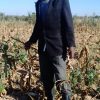News headlines for “Nature and Animal Conservation”
Rising Temperatures Drive Human-Wildlife Conflict in Zimbabwe
- Inter Press Service

BULAWAYO, Zimbabwe, May 17 (IPS) - Rising temperatures are being blamed for an increase in human-wildlife conflicts in Zimbabwe as animals such as snakes leave their natural habitat earlier than usual.
Women Organize to Fight Coastal Erosion in Southeastern Brazil
- Inter Press Service

ATAFONA, Brazil, May 17 (IPS) - Sonia Ferreira watched as the sea toppled buildings all around her for years. Finally, the impact of the rise in sea levels wrecked her home in 2019. Fishermen find their access to a fishing port limited, affecting their livelihoods. The residents of the coastal town of Atafona in southeastern Brazil count their losses to rising sea levels and climate change.
Ocean Action on Global Agenda as Negotiations to Save Biodiversity Deepen
- Inter Press Service

NAIROBI, May 15 (IPS) - The oceans are as fascinating as they are mysterious. Home to the largest animals to ever live on Earth and billions of the tiniest, the top 100 meters of the open oceans host the majority of sea life, such as fish, turtles, and marine mammals. But there is another world far below the surface. In the belly of the ocean, there are seamounts—underwater mountains that rise 1,000 meters or more from the seafloor.
SBSTTA and SBIBiodiversity Meetings Crucial for the Global South Begin
- Inter Press Service

NAIROBI, May 14 (IPS) - The 26th meeting of the Subsidiary Body of Scientific, Technical, and Technological Advisors (SBSTTA) of the United Nations Convention on Biological Diversity (UNCBD) started in Nairobi, Kenya, on Monday. Over 1,400 delegates, including 600 representing signatories or parties from over 150 countries, are present for the seven-day meeting at the headquarters of the United Nations Environment Programme (UNEP). A large number of members from Indigenous Peoples and other observer organizations, including women’s groups, are also attending the meetings.
Bringing the World's Food Production in Line with Global Climate Goals
- Inter Press Service

NORTHAMPTON, Massachusetts, May 14 (IPS) - Food systems—how we grow, transport, prepare, and dispose of the food we eat—are responsible for roughly one-third of all global greenhouse gas emissions. And those gases are changing the climate, which in turn is disrupting the food supply. It would seem to be a classic vicious circle.
Biodiversity Masterplan: Negotiations on Crucial Science, Technology for Implementation Underway
- Inter Press Service

NAIROBI, May 13 (IPS) - The triple planetary crises of climate change, biodiversity loss, pollution, and waste are escalating. At the current pace, the world is on track to lose one quarter of all plant and animal species by 2030, with one species already dying out every 10 minutes. One million species face extinction. Human activity has already altered three-quarters of the land on Earth and two-thirds of the ocean.
Latin America and the Caribbean Hit with Record-Breaking Heat and Other Climate Effects in 2023
- Inter Press Service

DOMINICA, May 10 (IPS) - Every year for the last four years, a collaborative effort involving scientists and other experts has assessed the state of the climate in Latin America and the Caribbean. The findings have revealed increasingly alarming trends for the world’s second-most disaster-prone region.
Dissenting Voices at Nairobi Soil Health Forum Over Increased Fertilizer Use
- Inter Press Service

NAIROBI, May 09 (IPS) - As the Africa Fertilizer and Soil Health Summit convened in Nairobi to review the progress made in terms of increasing fertilizer use in line with the 2006 Abuja Declaration, experts, practitioners, activists, and even government officials pointed out that accelerated fertilizer use may not be the magic bullet for increased food production in Africa.
Beyond the Fields: Unraveling Zambia's Drought Crisis and the Urgent Call for Climate-Health Solutions
- Inter Press Service

LUSAKA, May 08 (IPS) - For most families in Zambia, April is traditionally a month of plenty—it is typically the beginning of a harvest season for various food and cash crops. Both fresh and dried maize, groundnuts, pumpkins, and a whole variety of both traditional and exotic food crops are usually in full supply and readily available for consumption, supporting household food security and nutrition.
Rainy Chiloé, in Southern Chile, Faces Drinking Water Crisis
- Inter Press Service

SANTIAGO, May 02 (IPS) - The drinking water supply in the southern island of Chiloé, one of Chile's rainiest areas, is threatened by damage to its peatlands, affected by sales of peat and by a series of electricity projects, especially wind farms.
 Global Issues
Global Issues
